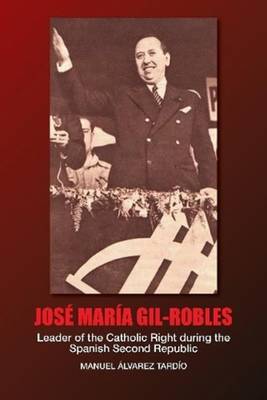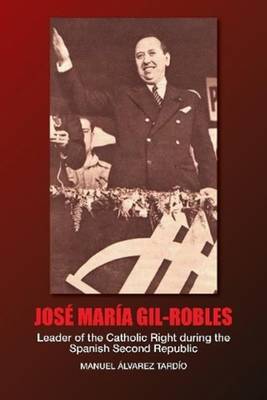
En raison d'une grêve chez bpost, votre commande pourrait être retardée. Vous avez besoin d’un livre rapidement ? Nos magasins vous accueillent à bras ouverts !
- Retrait gratuit dans votre magasin Club
- 7.000.000 titres dans notre catalogue
- Payer en toute sécurité
- Toujours un magasin près de chez vous
En raison de la grêve chez bpost, votre commande pourrait être retardée. Vous avez besoin d’un livre rapidement ? Nos magasins vous accueillent à bras ouverts !
- Retrait gratuit dans votre magasin Club
- 7.000.0000 titres dans notre catalogue
- Payer en toute sécurité
- Toujours un magasin près de chez vous
Jose Maria Gil-Robles
Leader of the Catholic Right During the Spanish Second Republic
Manuel Álvarez Tardío
254,45 €
+ 508 points
Description
Jose Maria Gil-Robles (18981980) was one of the major protagonists of twentieth-century Spanish politics. He founded the CEDA, the first modern party of the Spanish right, and did so during the Second Republic of 193136, at a critical moment for conservative Catholics opposed to several aspects of the new constitution. He sought to create a new legalist, possibilist right-wing movement that could win at the ballot box and demonstrate its strength in parliament. He achieved a great electoral victory in November 1933, but did not succeed in becoming prime minister. The left considered him a danger to the republican regime. In July 1936, after another election and a tense spring, there was an attempted coup detat, and the Civil War began. This brought a definitive end to party politics and, therefore, to the experience of the CEDA. From that point Gil-Robles lived in Portugal, and did not return to Spain until the 1950s. He supported the Allies during the Second World War, and argued for the restoration of the Spanish monarchy. He also played an important role in inspiring new movements for Christian Democracy. This book is an account of the republican period in the life of Gil-Robles. It is the first thoroughly-researched biography that examines in a balanced, well-documented manner the paramount, though still problematic, contribution he made to the democratization of Spanish conservative politics. It responds to certain crucial questions as to why the CEDA was unsuccessful, and what were the obstacles that it encountered in its attempts to amend the republican system. Equally, it also analyses the manner in which Gil-Robles led the forces of conservatism, one based on tenets that were clearly distant from fascism but equally opposed both to Marxism and liberal individualism.
Spécifications
Parties prenantes
- Auteur(s) :
- Editeur:
Contenu
- Nombre de pages :
- 240
- Langue:
- Anglais
- Collection :
Caractéristiques
- EAN:
- 9781845199036
- Date de parution :
- 15-05-18
- Format:
- Livre relié
- Format numérique:
- Genaaid
- Dimensions :
- 155 mm x 231 mm
- Poids :
- 439 g

Les avis
Nous publions uniquement les avis qui respectent les conditions requises. Consultez nos conditions pour les avis.






